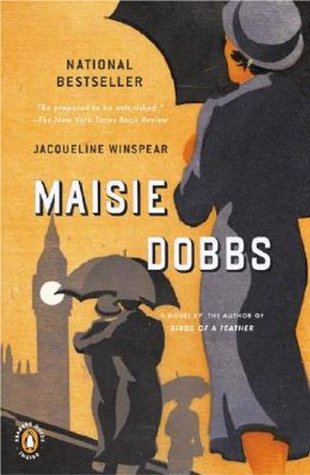 3.5 stars
3.5 starsAs often happens with novels I rate at 3.5 stars, I have mixed feelings about what I've read. On the one hand, the book as a whole was an easy read. The story moved at a quick clip--I never felt a drag in what was actually being told, regardless of how it pertained to the plot--the dialogue is crisp, and the story was entertaining. Yet, despite how entertaining the book was, it felt slightly misleading.
We start with young Maisie Dobbs as she opens up a detective agency and receives her first big case. Maisie, a young lady who was trained by a Hercule Poirot-type mentor and sponsored by a bored but socially-conscious aristocrat, treks through 1929 London to figure out if her client's wife is cheating on him, and in doing so discovers an even larger mystery involving the real "Walking Dead", those soldiers who returned from the Great War disfigured in more than just body. It took a while for the "mystery" of this mystery novel to finally unfold, and when it did, it was slightly disappointing. Anyone familiar with even the basic tenets and M.O. of a cult would've seen the denouement coming from a mile away. Not only that, but shortly into Maisie's investigation of this "mystery", the novel shifts and we spend time in Maisie's past where we discover how she came to the attention of her mentor and sponsor, and how the Great War shaped and affected her. Now, contrary to some, I like a good backstory: I like seeing where a character comes from, how they came to be who they are and discover their raison d'etre. And I understand why Winspear gives us that insight into Maisie--it allows us to understand a bit better how Maisie relates to the surviving soldiers she needs to deal with. The way Winspear did it, though, seems a bit clumsy and disruptive to the main plotline; with the mystery at the heart of the novel being so weak, it seems it would've profited from a direct telling rather than the interrupted one it got.
I also got the overwhelming sense of something "Mary Sue" about the whole book, not just the protagonist; every character was just so . . . nice. There's nothing wrong with nice, don't get me wrong, but even the villain wasn't bad per se, just thoroughly destroyed mentally by the terrors he'd gone through in the first World War. The few people that Maisie didn't "rub along with" were never out-and-out mean to her; any antagonism sprang from the other person's anger/disappointment/fear of something happening in their life, not from any personal dislike of Maisie herself. And the other characters in Maisie's life were overwhelmingly supportive of her, willing to cross any social/financial boundaries in order to assist her. Which is just so wildly unrealistic. I admit, I'm the "glass half empty" type of person. (Actually, I'm the "the glass is half empty because the glass is cracked and leaking and will cut me if I pick it up" type person.) So I have a natural aversion to anything too perky or sweet. But to have a good story is to have friction and drama, which only comes when things don't go easy: when people are mean to you, maybe for no good reason, maybe for every reason; when things are hard and no help is forthcoming from those who could ease the way, making the struggle that much more of an uphill battle. A life in which things go too easy, where everyone is on your character's side and they get all the help they need or want from those around them, has the potential to be a rather boring story.
From the author's notes and mini interview at the back of the book, the main theme of Maisie Dobbs was a personal one based on Winspear's curiosity of WWI-era Britain as well as family history/stories of that time period. Considering the violence and social upheaval the first world war engendered, perhaps Winspear didn't want to add any fictional conflict from the actions of her characters. Maybe she wanted to present a more idealized image of the ordinary citizen to counteract all that violence. Who knows. It just seems to do a disservice to the reader in my opinion. After all, even in the midst of chaos, life goes on: Good people still do good deeds, evil people still do evil deeds, and most people reside somewhere in between as they work their way through life. That's where your conflict comes from. And that's where the stories come from.
Read from May 11-14, 2015
Reviewed May 15, 2015
No comments:
Post a Comment